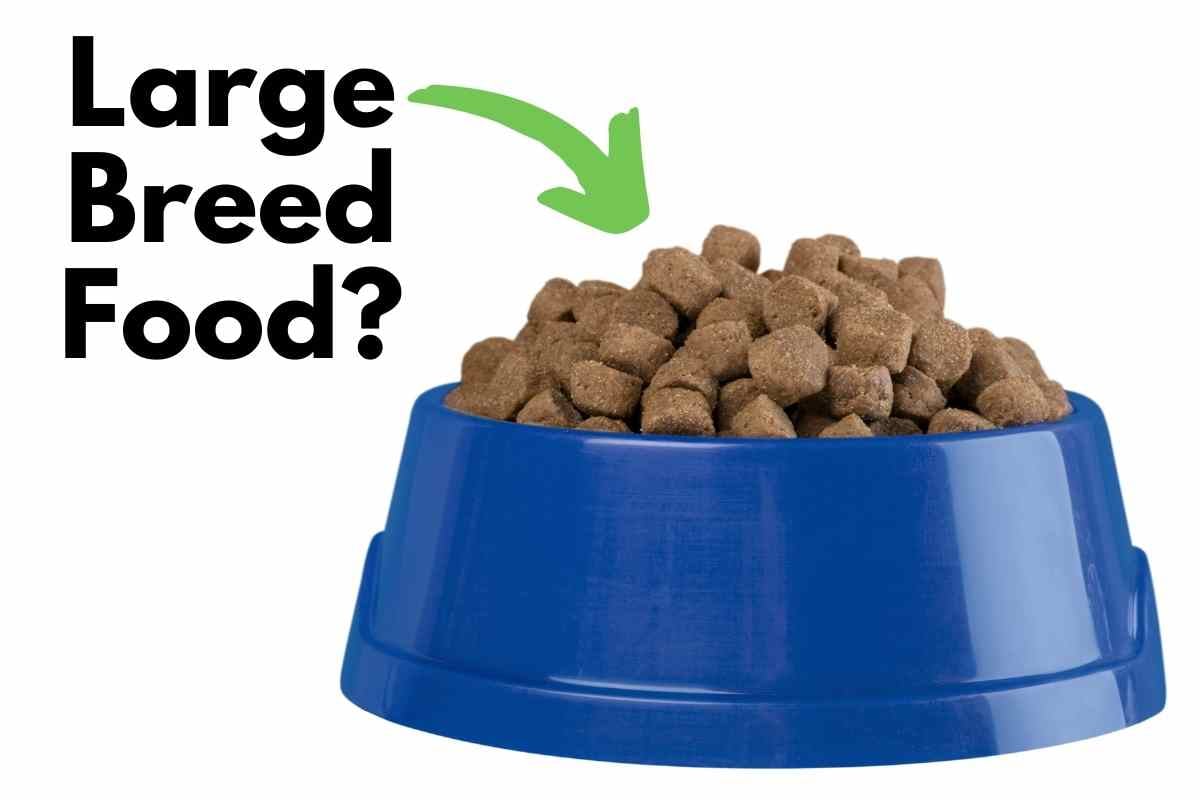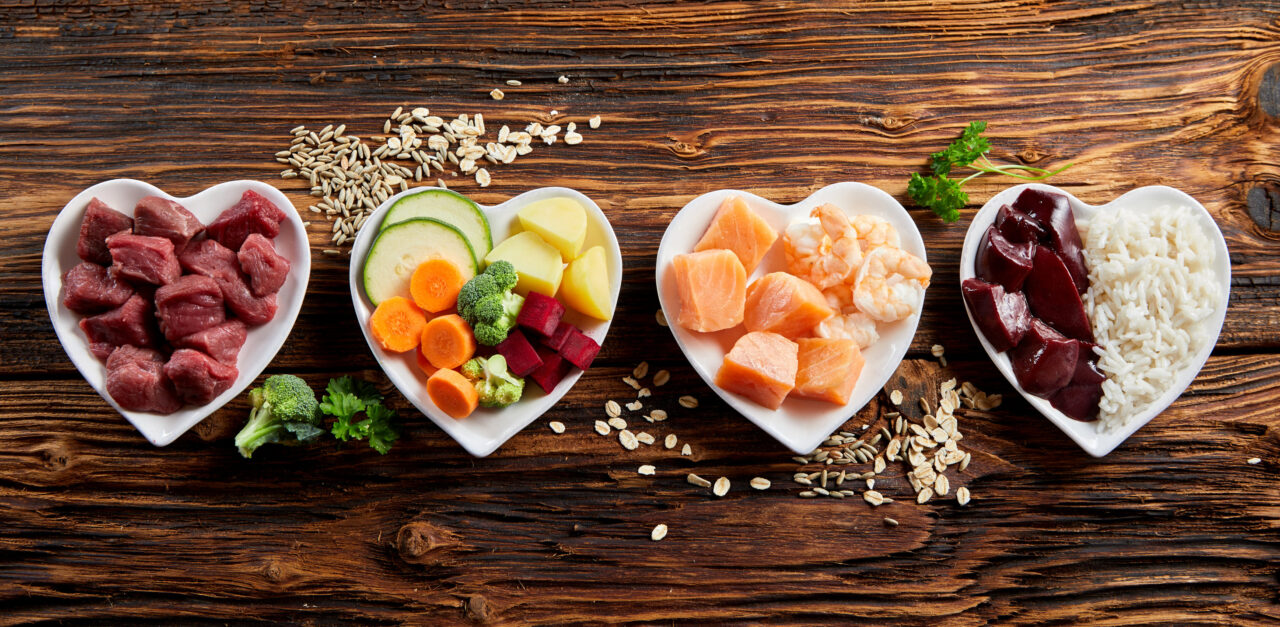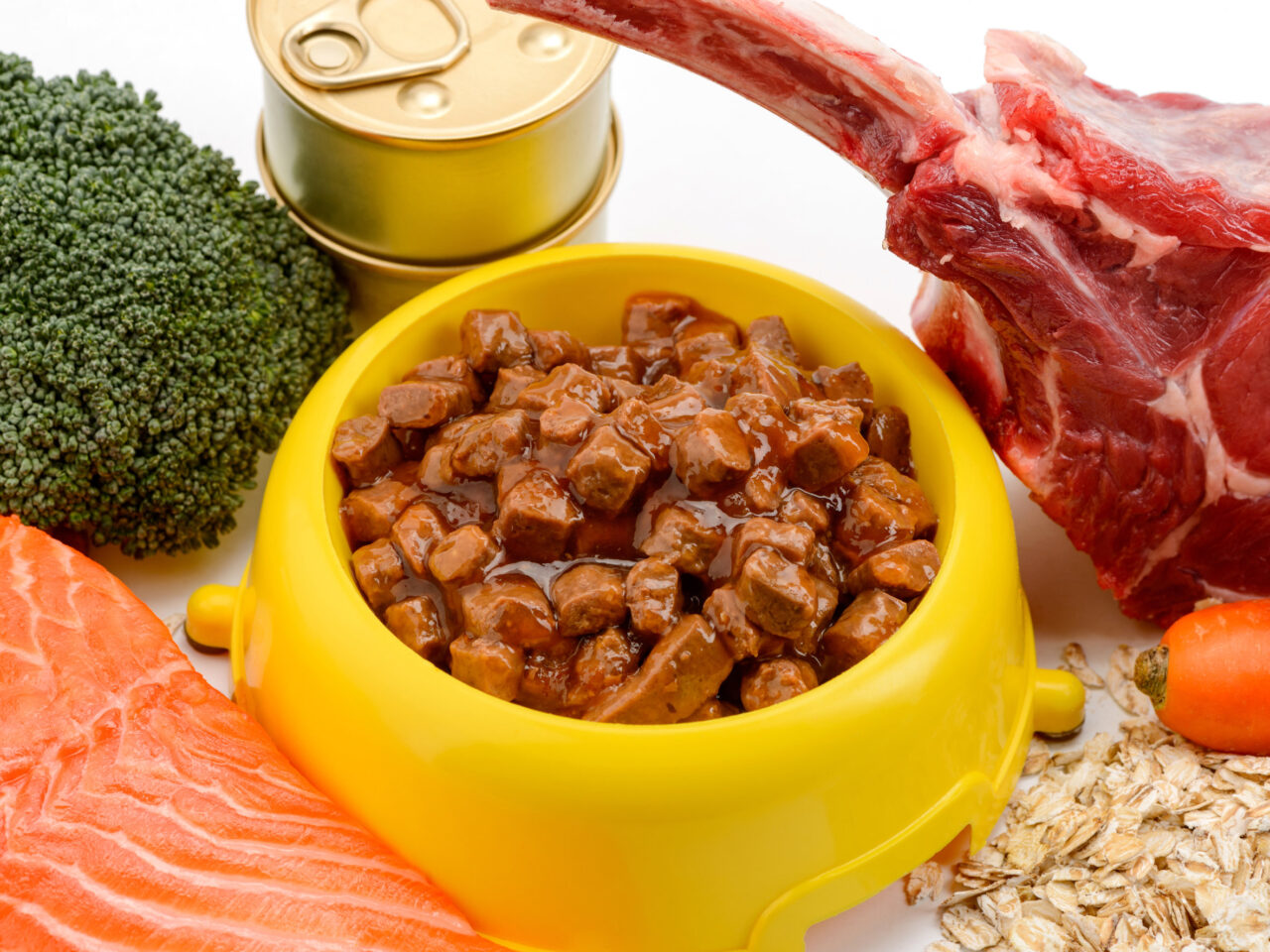Do Goldendoodles Need Large Breed Food?

Even though dogs are man’s best friend, caring for dogs isn’t always man’s favorite task. One thing you must know is what type of food to feed your dog. Today we’ll talk specifically about food for Goldendoodles.
Standard Goldendoodles are considered a large breed and you can feed them large breed food. However, you can also feed them all breed-size dog food. Nutrition requirements will vary depending on the dog. The type of food a Goldendoodle should be fed depends on the size and age of the dog.
Which food you should get depends on your dog’s individual needs. Its age and weight are just two of the many factors that should affect what kind of food you feed it.
While researching Goldendoodle puppy food, be sure to bookmark and save our article on Best dog food for Goldendoodles and How To Deal With A Goldendoodle Picky Eater, like our mini doodle Lexie!
Are Goldendoodles a Large Breed?
Generally, Goldendoodles are considered a large breed of dogs. This is because they are related to golden retrievers.
Standard Goldendoodles are generally 22 inches tall when measured at their shoulder. They are considered a large breed of dogs.
If you’re going by weight, “Most veterinarians and pet nutritionists consider a puppy a large breed if they’ll be 55-100 lbs when fully grown.” (Source) Goldendoodles fit pretty well into that weight range.
Standard Goldendoodles are generally 50-70 lbs. This can vary greatly depending on the specific dog, how much you feed it, and some other factors. (Source) This puts them at a similar weight as other large breed dogs.
However, there are four different sizes of Goldendoodles, standard, medium, mini, and petite/toy. The size difference can be dramatic, with petite or toy-sized Goldendoodles only getting to 10-20 pounds.
These three other sizes of Goldendoodles should be fed different foods than a standard Goldendoodle. But we are going to focus on the standard size of Goldendoodles.
Age Affects the Food Goldendoodles Need

When trying to figure out which brand of food to buy for your dog, an important factor to take into consideration is your dog’s age. Is it a puppy, an adult, or a senior?
Here is the general age breakdown for Goldendoodles.
- Puppy – under 15 to 18 months
- Adult – over 15 to 18 months
- Senior – over 7-10 years
(Source)
Standard adult Goldendoodles can work well with most good dog food brands, whether large breed or all-breed dog food.
However, puppies need special food to support their growing bodies. Also, senior dogs might need different foods. They don’t always, but sometimes a change in food is necessary once they get older than about 7 years.
What makes large breed food different?
According to Petbarn, a large, online pet food and accessory store:
“Food formulated for [large] dogs … includes optimal levels of calcium for controlled bone development. High-quality
puppy food designed for large breed dogs is a little less energy-dense so they can grow at a rate that supports their bones and joints.” (Source)
There are two different types of large-breed dog food. There’s the type made for adults and the types made for puppies.
The difference is that large-breed puppy food supports the puppy as it grows, ensuring it doesn’t give it too much energy while still supporting its bone growth. But once the dog has grown, it needs different amounts of nutrients.
While it is not necessary to feed large dogs large-breed food over all-breed food, it might be beneficial for your dog’s health.
What is the best food for a Goldendoodle?

You can either feed your dog large breed dog for or all-breed size dog food. There are fewer options for large-breed dog food, but there are still some good ones for Goldendoodles.
Here are some of the most popular all-breed dog foods for Goldendoodles.
- Merrick With Healthy Grains
- Orijen Original
- Blue Buffalo Natural Adult
- Nom Nom Fresh Pet Food
Now, here are some large breed dog food options for Goldendoodles:
- Iams ProActive Health Adult Large Breed
- Wellness Large Breed Complete Health Adult Formula
Many factors might affect which dog food you should buy, including availability, ingredients, and cost.
But in the end, deciding which dog food you should get depends on your dog and its specific needs. Make sure to research the different brands before buying them.
It also might be beneficial for you to learn if your dog has any food sensitivities or allergies. Some dogs don’t do well with grains or other ingredients that might be in these dog foods.
Goldendoodle puppies
Dog owners, don’t just feed your large breed puppy extra food, feed them the right food. Like we said earlier, there is dog food designed especially for large breed puppies.
It will help support their growth and give them the energy they need.
Some Goldendoodle puppies would be fine with good all-breed dog food, like Taste of the Wild High Prairie Puppy Formula, Nulo freestyle puppy food, Purina Pro Plan Dry Kibble Pupp, or Royal Canin Healthy Dry puppy food.
But other Goldendoodle puppies will benefit from large breed puppy food. You could consider feeding your puppy Orijen Large Breed
There are lots of options of dog food to fit your dog’s personal nutritional needs, like grain-free dog food. However, those options might cost more.
Senior goldendoodles
Just like for puppies, there are some dog foods made just for senior dogs. An example of this is the Blue Buffalo Freedom Senior Chicken Recipe Grain-Free Dry Dog Food or Purina One SmartBlend Vibrant Maturity.
However, some senior dogs can’t eat dry food, for whatever reason. This means that you should be feeding your senior Goldendoodle wet food.
This means that you might need to transition from your regular food to a different brand of food. When you do this, you need to be careful.
You need to switch gradually from one brand of food to another.
This helps your dog adapt to the new food. If you switch too quickly, it can cause your dog to have an upset stomach. Also, it can help you see if your dog has a food sensitivity to something in the new food.
Related Reading
- The Best And Worst Foods For A Goldendoodle Diet (Vet-Approved!)
- How Much To Feed A Goldendoodle Puppy: A 6-Stage Guide
Best Food for Goldendoodle Puppy: Top Picks and Feeding Guide - How Much Water Should a Goldendoodle Puppy Drink?
- At What Age Is A Miniature Goldendoodle Fully Grown?
- How To Take Care Of A Goldendoodle Puppy: 15 Veterinarian Tips
- Goldendoodle Ear Infection: 3 Common Problems & Treatments (Veterinarian Weighs In!)
- Why Does My Goldendoodle Itch So Much? (Veterinarian Advice!)